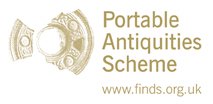The Portable Antiquities Scheme provides a unique avenue for documenting small finds which, although not associated with any archaeological context, can still yield important new information about local and national history purely on their own merits. One such find recently recorded by the Surrey FLO, is SUR-F847F3 – a papal bulla or lead document seal found near Odiham in north east Hampshire. This type of seal was used to authenticate papal documents, and was attached to them with silk or hemp cords; the obverse typically features the name of the pope and the reverse shows the heads of St Peter and St Paul.

The vast majority of these objects relate to medieval popes, however the obverse of this example reads PAVLVS // •PA•PA• // IIII, demonstrating that it was issued by Pope Paul IV (1555-1559). In its association with this pope it is absolutely unique on the PAS database as being the only post-dissolution bulla ever recorded. It is believed to represent the latest known example of this sort of object found anywhere in the country.
The significance of this bulla becomes particularly apparent when this date is considered against its historic context – the brief Catholic revival under Queen Mary and Philip II of Spain (1553-1558). This means that it can be interpreted against the background of the (temporary) resurgence of communications between Rome and the various Catholic entities in England, as the papacy attempted to re-assert itself in England under royal assent.
The findspot is not far from an important royal deer park and manorial site (Odiham Place), owned at this time by Chideock Paulet, a noted catholic and the son of the Marquis of Winchester. He was also at one point treasurer to the Bishop of Winchester who was himself based at the nearby palace at Farnham in Surrey and who controlled large estates in this part of the country. At this time the Bishop was one John White (1510–1560) a Roman Catholic who was promoted by Queen Mary to the see in 1556 and who was subsequently deprived of it in 1559 on the accession of the protestant Elizabeth I. He would therefore perhaps seem to be the most likely candidate for the intended recipient of the documents to which this object was attached.
Although the details of the decree secured by this object will never be established, the find helps illustrate the religious turmoil which dominated the late 1550s in England, as the country struggled with its spiritual identity both domestically and in relation to the ecclesiastical power structures in Europe and Rome. In view of its unique importance, the finder has very generously agreed to donate this object to Hampshire Cultural Trust. It is due for a more complete write up in the journal of Post Medieval Archaeology later in the year.



